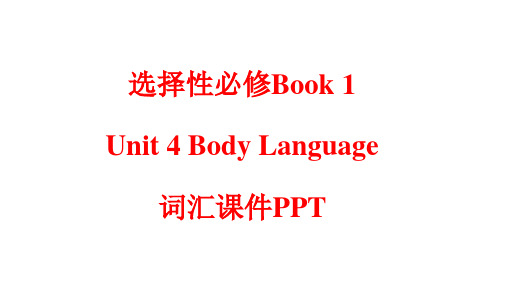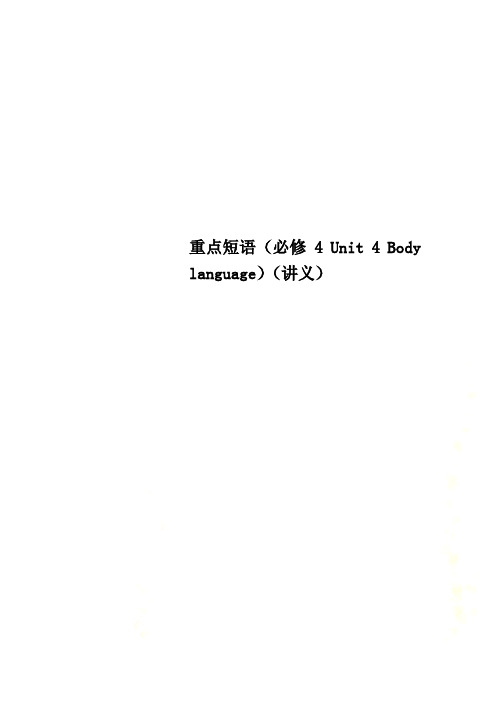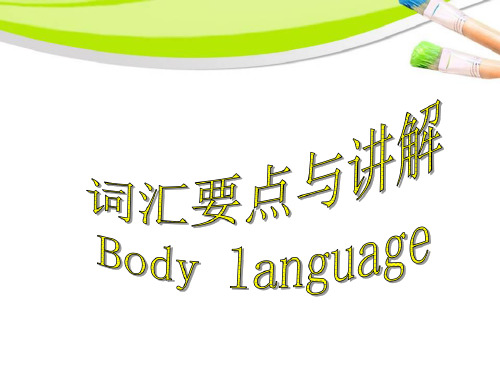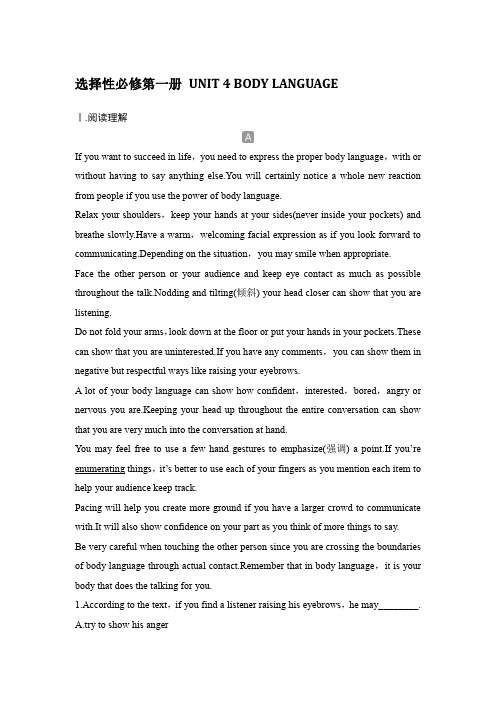Unit 4 Body language(vocabulary)
单元讲解必修四unit4 body language

单元讲解必修四unit4 bodylanguage课本单元讲解(含课文音频):必修四Unit4 Body language_doctor今天,要和大家分享的是人教版必修四Unit4常考单词、高频短语和写作句式,并附有课文音频学起来哦!Unit4 Body language常考单词、高频短语和写作句式Ⅰ. 常考单词必背1.statementn. 陈述;说明His statement is pletely untrue.他的话完全是在撒谎。
2.greetvi.&vt. 迎接;问候I greeted her with a smile.我笑着向她致意。
(1)greet sb with... 用……迎接……;用……向某人打招呼(2)greeting n. (常用复数形式) 问候;祝贺;贺词3.representvt. 代表;象征In the western countries,V often represents victory.在西方国家,V常象征着胜利。
He represented himself as a doctor.他自称是一个医生。
[快速闪记](1)represent sth to sb 向某人说明某事,向某人传达某事represent...as... 把……描绘成……represent oneself as/to be... 自称是……(2)representative n. 代表4.curiousadj. 好奇的The children were curious to know what was happening over there.孩子们很想知道那边发生了什么事。
[快速闪记](1)be curious about 对(某事物)感到好奇be curious to do... 很想做某事;渴望做某事(2)curiously adv. 好奇地5.approachvt..&vi.接近;靠近;走近 n. 接近;方法;途径As summer approached,the weather became hotter and hotter.随着夏天的临近,天气越来越热。
Unit 4 Body Language 单词默写-高中英语人教版(2019)选择性必修第一册

Unit 4 Body languageDAY1(教材P109: interaction-P110:reliable)1. n.交流﹔相互影响2. vi.( 根据情况)变化﹔改变3. adj.合适的﹔恰当的4. 相比之下5. vi.赞成﹔同意vt.批准﹔通过6. vt.表现﹔表达﹔说明﹔证明7. n.手势﹔姿势﹔姿态8. vt.当场看到﹔目击﹔见证n.目击者﹔证人9. vt.使用﹔应用﹔雇用10. adj.相同的11. v.把……理解(解释)为vi.&vt.口译12. vi.相异﹔不同于13. (与)相比较14. n.面颊﹔脸颊15. vt.较喜欢﹔选择﹔有利于n.帮助﹔恩惠﹔赞同16. vi.鞠躬﹔点头vt.低(头) n.弓﹔蝴蝶结17. n.腰﹔腰部18. 推理﹔推断19. 消除﹔分解﹔打破20. n.隔阂﹔障碍21. adj.假装的﹔假的﹔冒充的22.n.愤怒﹔怒气vt.使生气﹔激怒23.adj.可靠的﹔可信赖的DAY2(教材P110: incident-P110:occupy)1. n.发生的事情;严重事件;冲突2. n.&vt.审讯;审判;试验;试用3 adj.轻微的;略微的;细小的* adv.略微地;稍微地4. adj.双胞胎之一的;孪生之一的n.孪生之一;双胞胎之一5. adj.不涉及言语的;非言语的6. n.评价;评定7. vt.评估;评价8. adj.内部的;里面的9. 直起来;整理;收拾整齐10. vi.垂头弯腰地走(或坐等)11. n.故作姿态;(为画像、拍照等摆的)姿势vi.摆好姿势vt.造成(威胁、问题等)12. vt.&vi.( , )(使)弯曲;倾斜;偏向13. vt.揭示;显示;露出14. vt.使更清晰易懂;阐明;澄清15. 换句话说;也就是说16. n.教师;教育工作者;教育家17. vt.给(试卷、问题等)打钩号vi.(钟表)发出嘀嗒声n.钩号18. n.趋势;倾向19. vt.放低;降低;减少adj.下面的;下方的;较小的20. vt.意味着;暗示21. adv.几乎不;勉强才能; 刚刚22. n.下巴23. vt.占据;占用DAY3(教材P110:stare-tone)1.vi.着看;凝视n.凝视2.n.天花板﹔上限3. vt.分散(注意力) ﹔使分心4. vt.察觉﹔看待﹔理解5. vi.&vt.区分﹔辨别6. n.焦虑﹔担心﹔害怕7. n.胸部﹔胸膛8. adj.难堪的﹔尴尬的9. adj.羞愧﹔惭愧10. adv.只是﹔仅仅﹔只不过11. (短暂地) 访问﹔要求(某人讲话等)﹔正式邀请12. vi.&vt.费心﹔麻烦﹔因…操心n.麻烦﹔不便13. vi.&vt.哭泣﹔流泪14. 有某种影响﹔在工作15. n.矛盾冲突vi.冲突﹔抵触16. (= )vi.&vt.询问﹔打听17. adv.最终﹔最后18. vt.调整;调节vi.&vt. 适应﹔(使)习惯19. vi.干预﹔介人20. vi.( 对) 起反应﹔回应﹔(对食物等)有不良反应21. n.组成部分﹔零件22. n.语气﹔腔调﹔口吻DAY4Group1 名词1. n.愤怒﹔怒气vt.使生气﹔激怒2. n.焦虑﹔担心﹔害怕3. n.评价﹔评定4. n.隔阂﹔障碍5. n.麻烦﹔不便6. n.弓﹔蝴蝶结7. n.天花板﹔上限8. n.面颊﹔脸颊9. n.胸部﹔胸膛10. n.下巴11. n.组成部分﹔零件12. n.矛盾冲突vi.冲突﹔抵触13. n.教师﹔教育工作者﹔教育家14. n.帮助﹔恩惠﹔赞同15. n.手势﹔姿势﹔姿态16. n.发生的事情﹔严重事件﹔冲突17. n.交流﹔相互影响18. n.故作姿态﹔(为画像、拍照等摆的)姿势19. n.趋势﹔倾向20. n.钩号21. n.语气﹔腔调﹔口吻22. n.审讯﹔审判﹔试验﹔试用23. n.孪生之一﹔双胞胎之一24. n.腰﹔腰部25. n.目击者﹔证人Group2 动词1. vt.调整﹔调节vi.&vt. 适应﹔(使)习惯2. vi.赞成﹔同意vt.批准﹔通过3. vt.评估﹔评价4. vt.&vi.( , )(使)弯曲﹔倾斜﹔偏向5. vi.&vt.费心﹔麻烦﹔因…操心6. vi.鞠躬﹔点头vt.低(头)7. n.面颊﹔脸颊8. vt.使更清晰易懂﹔阐明﹔澄清9. vi.冲突﹔抵触10. vt.表现﹔表达﹔说明﹔证明11. vi.&vt.区分﹔辨别12. vt.分散(注意力)﹔使分心13. vt.使用﹔应用﹔雇用14. vt.较喜欢﹔选择﹔有利于15. vt.意味着﹔暗示16. ( = )vi. &vt.询问﹔打听17. vt.把…… 理解(解释)为vi.&vt.口译18. vi.干预﹔介人19. vt.放低﹔降低﹔减少20. vt.占据﹔占用21. vt.察觉﹔看待﹔理解22. vi.摆好姿势vt.造成(威胁、问题等)23. vi.( 对) 起反应﹔回应﹔(对食物等)有不良反应24. vt.揭示﹔显示﹔露出25. vi.垂头弯腰地走(或坐等)26. vi.着看﹔凝视n.凝27. vt.给(试卷、问题等)打钩号vi.(钟表)发出嘀嗒声28. vt.审讯;审判;试验;试用29. vi.(根据情况)变化;改变30. vi.&vt.哭泣;流泪31. vt.当场看到;目击;见证n.目击者;证人Group3 形容词和副词1. adj.合适的;恰当的2. adj.羞愧;惭愧3. adj.下面的;下方的;较小的4.adv.几乎不;勉强才能; 刚刚5. adj.难堪的;尴尬的6. adj.假装的;假的;冒充的7. adj.相同的8. adj.内部的;里面的9. adv.只是;仅仅;只不过10. adj.不涉及言语的;非言语的11. adj.可靠的;可信赖的12. adj.轻微的;略微的;细小的adv.略微;稍微13. adj.双胞胎之一的;孪生之一的14. adv.最终;最后Group4 核心词块1. 似乎;好像;仿佛2. 急救箱3. 严重受损;破败不堪4. 震惊;吃惊5. 露天;在户外6. 现有(尤指帮助)7. 消灭;彻底消除。
Unit 4 Body Language 词汇知识点课件 高二英语(人教2019版选择性必修第一册)

.call on
• ①拜访(某人) • ②号召;要求
•n
• [C]目击者;见证人;证人
• be (a) witness to ...是...的目击者;是...的见证人
• vt
• 目击;亲眼所见
.employ
• vt
• ①雇用;聘请
• employ sb to do sth雇佣/聘请某人做某事
• ②[正式用语]使用;利用
• be employed in doing sth忙于做某事
• 内部的;体内的;内心的
.straighten up
• 起来;整理;收拾整齐
• 【拓展】
• straight
• adj①(笔)直的; 平直的②整齐的;端正的③正直的;诚实的④纯粹的
• get sth straight [口语]弄清楚某事
• adv①笔直地;成直线地②直接;立即③连续地
• straight away / off立即;马上
.distract
• vt
• 分散(注意力);使分心
• 【同根词】
• distracted adj.注意力分散的;思想不集中的
.perceive
• vt
• [正式用语]察觉;发觉;看待;理解
.distinguish
•v
• ①vi&vt区别;辨认;使有别于 • ②vt使杰出;使显出特色
• 【同根词】
• 【同根词】
• bare adj ①赤裸的;光秃秃的;空的 ②仅有的;最基本的
.chin
• n.
• 下巴,下颌
.occupy
• vt
• ①占领;占据 • ②占用/占去(时间、空间) (take up) • ③使忙碌
高一英语必修四:Unit+4+Body+language+全单元+

Unit 4 Body LanguageI. Teaching aims and demands 教学目标和要求:1.Topics 话题Talk about body language2.Function: 交际功能提供和请求帮助(Making offers and requests)Can/Shall I help you with that? Could you help me with...? Would you like me to...?Do you need some help with that? Could you please...? No,thank you.Thanks for all your help. Would you like some help? No,thanks.I can manage it myself. Could you give me a hand with this? That's very nice of you. Is there anything else I can do for you?3.Vocabulary 重点词汇和短语unfair; customer; avoid; suitcase; ahead; manage; fold; vary; crazy; part; firm; handshake; bow; fist; bend; tap; gently; anger; useless; occur; focus; specific ahead of; give sb a hand; get through; tear down ;hold up; make a face; in order4.Grammar:语法动词-ing形式作主语、宾语和表语(2)1.用英语表达‘做某事如何的’---动词-ing形式作主语2.有些及物动词后面需跟动词-ing形式作宾语3.绝大多数介词后面需跟动词-ing形式作宾语4.用英语表达'什么事是某事' ---动词-ing形式作表语II. Difficult pointsIII. Main teaching aids教具:A tape-recorder; Multimedia, projector, role cardsⅣ. Main teaching methods 教法:1. The interaction between the teacher and the students, and among the students themselves; Attention to the students’ listening, speaking, reading and writing; and so on.2. Listening-and–answering activity to help the students go through with the listening material.3. Use both individual work and group or pair work to make every student work and think in class V. Teaching procedure:Period 1第一节(一)明确目标1. Learn body language. Warming up to arouse the students love in talking.2. Do some listening to improve the students listening ability.3. Making simple dialogues to train the students speaking ability.(二) 整体感知Step 1 PresentationAsk some students to the front and act out the correct emotions.2. Ask students to make a dialogue in pairs using body language.(三)教学过程Step 2 Warming upGo through warming up and make sure the students understand it and can match each picture with the correct emotion and the correct sentence.Answers (From left to right):1 Picture 1: Confused I don't know what to do.2: Angry I can't believe she said that! That is so unfair!3: Sad I've lost my wallet!4: Happy I got an A in my exam!5: Tired It's been a long day. I can't keep my eyes open.2 Various answers are possible but explanations for choices should refer to details in the pictures.3 Various answers are possible.Step 3 Listening comprehensionNow let s have some listening training.LISTENING TEXT:Part 1Which of the following is a form of communication?A Speaking to someone.B Standing in a comer at a party with your arms crossed.C Avoiding eye contact with the salesman when you are buying something.D All of the above.Speaking, or using language to communicate, is probably the best known form of communication. However, the body language used in answer B and the lack of eye.contact in answer C can say as much or more as speech.Let's take a closer look at answer B. You are at a party and see your friend Tom standing alone in a comer with his arms crossed. When you ask him if he is enjoying the party, he says, "Yes, I'm having a great time." Do you believe him? Probably not, because his body language is telling you that he doesn't like being there. If someone asks you later whether you think Tom liked the party, you might say "He said he enjoyed it, but it didn't look like it."Now let's look at C. Imagine that you are a salesman at a store. You always greet your customers with a smile and then talk for a while. But what if one of your customers avoids making eye contact with you? Do you still speak to her? Probably not. By not looking at you, she has told you that she doesn't want to talk to you.Part 2Body language can help you decide whether a person is telling the truth or not. If a person covers his or her mouth with his or her hand, or if he or she puts his / her finger over his / her mouth, he or she may be lying. If the person you are talking to touches his or her ears or neck, this is also a sign that he or she may not be telling you the truth. How can you tell if the person you are talking to is interested in what you are saying? Watching his or her body language will give you a goodidea. Someone who is interested will lean forward in their seat and will look at you when you are speaking. They may also nod their head to show that they are listening and agree with what you are saying.1 Answers to Part 1 : ID 2B 3AAnswers to Part 2: IB 2B2 Answers will vary but here are a few appropriate ways to communicate each feeling using body language.Enjoying sthsmiling, opening eyes wide, rocking one's head from side to sideLiking someonesmiling, hugging oneself, leaning one's head to one side, lowering with one's eyes, leaning forward or closerInterested in sthstaring a lot, putting a hand 10 your chin as in thought, leaning forward, opening eyes wide, shaping your mouth with a big 0, responding with the same expressions as the person who you're listening toDisagreementlooking away, putting one's head down into one's arms, talking to oneself, whistling, frowning, folding one's armsNot enjoying sthyawning, sighing, complaining, frowning, looking awayIn a hurrysighing, biting down with one's teeth, not standing still, tapping one's toes on the floor, looking toward the doorNot interestedsame as not enjoyingWanting to talk to othersraising one's hand to be called on, trying to speak up, waving one's arms over one's head to }&et attention, jumping up and down, shaping one's mouth in a big 0Step 4 Speaking practiceSituation 1: An old man is carrying a very heavy suitcase.Asking for help(0 = Old man; P = Paul)0: Excuse me, young man. Could you give me a hand with this, please? It's very heavy.P: Oh, of course, I'd be happy to. There we go.0: Thank you.P: You're welcome.0: Oh my, this is heavy. Excuse me, sir, could you help me with this bag?P: Certainly. Where should I put it?0: Thank you. Just put it over there, please.P: There you are.0: Thank you, that's very nice of you.P: Dh, not at all.Offering helpP: That bag looks very heavy. Do you need some help with that?0: Oh, thank you. Could you please put it over there? P: No problem. There you are. Is there anything else I can do for you?0: No, thank you. Thanks for all your help.P: Woultl you like some help?0: Oh, yes, please. This bag is simply too heavy for me. Could you give me a hand with it?P: Sure. My, this bag is heavy! Ah, there we go. Where shall I put it'?0: Over there, please. Thank you so much!P: You're welcome.Situation.2:..Someone is late for a flight and wants to go ahead of the queue.(J = Jim; A = Passenger A; B = Passenger B)J: Excuse me, but I'm late for my flight. Could I please go ahead of you?A: Why sure. My flight doesn't leave for another hour. Are these bags yours? Shall I help you with that?J: No, thanks. I can manage it myself. (To the passenger standing at the check-in counter.) Hi. May I cutin front of you? I don't want to miss my plane.B: Go right ahead. I'm still looking for my ticket. Do you need some help with that bag?J: Yes. Could you please help me put it up here? Thank you.B: You're welcome.J: Oh no! I'm late for my flight.A: Excuse me, but did you say that you were late? Would you like to-go ahead of me? My flight doesn't leave for another hour.J: Thank you, that's very nice of you! Could you helpme with this bag, please?A: Sure. There you are. Would you like me to bring it up to the counter?J: Oh, no, thank you. I can manage it myself now.Situation 3: An old and sick person is on a crowded bus and wants to sit down.(0 = Old person; P = Passenger)0: Oh my, this bus is crowded. Excuse me, could you please help me with this bag?P: Certainly. There you are. Here, please take my seat, you look a bit tired.0: Thank you. Yes, I'm not feeling well today. I think I have a bit of a cold. Could you please tell me when we reach Long Street? I'm afraid I can't see where we are when the bus is this crowded.P: Sure. I'll let you know when we get there.P: Shall I help you with that?0: No thanks. I can manage it myself. But could you please let me sit down for a while? I'm not feeling well.P: Oh, of course. Please take my seat.0: Thank you. That's very nice of you.P: Not at all.(四)总结扩展Step 5 Necessary language pointsToday we ve done some listening and speaking, and learn how to give advice and some everyday English used between doctors and patients.Listening and speaking听说要点1>What if a customer avoids making eye contact with you?What if ...? [用法]假使...呢?;若是...又怎么样?[举例]What if he doesn't come (What shall we do if he doesn't com)? 如果他不来,我们怎么办呢?What if it's true (Even if it's true, does it mattere)? 即使这是真的,又有什么关系吗? avoid [用法]vt. 避免[举例]They all avoided mentioning that name. 他们都避免提及那名字。
重点短语(必修 4 Unit 4 Body language)(讲义)

重点短语(必修 4 Unit 4 Body language)(讲义)高中英语重点短语(必修 4 Unit 4 Body language)1. 学习短语的基本含义和用法。
2. 灵活运用所学的短语,学会用短语造句。
重点:短语at ease, in general, lose face, in most cases的用法。
难点:与face有关的短语和case的相关用法。
【短语学习】1. at ease舒适;快活;自由自在(相当于comfortably)with ease轻易地,毫不费力地(相当于easily)feel/look at ease 感到/看上去轻松自在put/set sb. at ease 使某人感到轻松自在take one’s ease 休息,放松一下stand at ease (口令)稍息When you feel nervous, you’d better listen to some light music to put yourself at ease.当你感到紧张时,你最好听些轻音乐使自己放松一下。
I never feel completely at ease with him.我跟他在一起总感到不是很自在。
Don’t overwork yourself and take your ease.不要过度劳累,休息一会儿。
The most universal facial expression is,of course,the smile—its function is to showIn general, though, studying international customs can certainly help avoid difficulties in today’s world of cultural crossroads!总的来说,在当今文化交融的世界里,学习不同国家的习俗肯定能够帮助我们避免交往中的困难!Her English pronunciation is not so bad in general.她的英语发音一般来说是不错的。
人教必修四Unit4-Body-language-词汇要点讲解

(3)面对困难时,他们从不放弃而是努力寻找出路。
F_a_c_e_d_w_i_th_d_i_ff_ic_u_l_ti_es___,_they never give up but try their best to find a way out.
司机看错了一个重要的信号。
• I'm afraid you completely misread the situation. 恐怕你完全看错了形势。
• 3 facial 脸部的,面部的 • facial expression 面部表情 • facial tissues 面巾纸 • facial painting 脸谱 • facial cream 美容霜
ease. 他递给她一杯咖啡,让她放松下来。
with ease=easily轻易地
At ease ! 稍息!
10.lose face 丢脸;失面子 lose face with sb在…面前丢脸
lose heart 泄气,灰心 ; lose one’s heart to…爱上…
(1)save one's face
• 5 function n.作用,功能,职能 v.起作用
• The function of the government is to serve the people.
• 政府的职能是为人民服务。 • The sofa can also function as a bed.
这沙发也可以当床。
• Some English nouns function as verbs.
她从椅子上跳起来迎接她父亲。 greet sb with (a smile)用…向…问候 greeting(s) n.
新课标人教版必修四Book4 Unit4 Vocabulary2

• • • • • • • • • • • • • • • • •
I. 重点词语识读 1.statement n.__________ 2. greet vi. & vt. ________ 3.represent vt. ________4. association n. ___ 5.dormitory n. _______6.canteen n.______ 7. flight n._________ 8.curious adj._____ curiously adv. ______ 9.approach vt. & vi. _______ n. ________ 10. cheek n. ______ 11. defend vt. _______ defence n. _______12. major adj. _____ 13.misunderstand vt. (misunderstood, misunderstood)_____ misunderstanding n.____14.dash vi._____15.adult n. _______adj. ____ 16.△simply adv. _______17.spoken adj. _______unspoken adj. ______ 18. posture n. _______19. Spain n. _______20.Italy n. ________ 21. likely adj. _______22. crossroads n.________23. employee n. ____ 24.frown vi. ______ 25.fist n_______26. yawn vi. _______ 27. respectful adj. ________28. subjective adj. ________ 29. hug vi. & vt._______30.rank n. _____31.cassette n._______ 32. defend …against_____33.be likely to _____34.in general ________ 35.lose face ________ 36. turn one ‘s back to _____
(人教版)选择性必修第一册:UNIT 4 BODY LANGUAGE(含解析)

选择性必修第一册UNIT 4 BODY LANGUAGEⅠ.阅读理解If you want to succeed in life,you need to express the proper body language,with or without having to say anything else.You will certainly notice a whole new reaction from people if you use the power of body language.Relax your shoulders,keep your hands at your sides(never inside your pockets) and breathe slowly.Have a warm,welcoming facial expression as if you look forward to communicating.Depending on the situation,you may smile when appropriate.Face the other person or your audience and keep eye contact as much as possible throughout the talk.Nodding and tilting(倾斜) your head closer can show that you are listening.Do not fold your arms,look down at the floor or put your hands in your pockets.These can show that you are uninterested.If you have any comments,you can show them in negative but respectful ways like raising your eyebrows.A lot of your body language can show how confident,interested,bored,angry or nervous you are.Keeping your head up throughout the entire conversation can show that you are very much into the conversation at hand.You may feel free to use a few hand gestures to emphasize(强调) a point.If you’re enumerating things,it’s better to use each of your fingers as you mention each item to help your audience keep track.Pacing will help you create more ground if you have a larger crowd to communicate with.It will also show confidence on your part as you think of more things to say.Be very careful when touching the other person since you are crossing the boundaries of body language through actual contact.Remember that in body language,it is your body that does the talking for you.1.According to the text,if you find a listener raising his eyebrows,he may________.A.try to show his angerB.want to give his own opinionC.not understand what you sayD.want to prove his confidence2.The underlined word “enumerating” in paragraph 6 may mean “________”.A.consideringB.judgingC.numberingD.discussing3.What’s the author’s suggestion if you have a larger crowd to communicate with?A.To walk at a slow pace.B.To shake hands with every person.C.To look down at the floor.D.To fold your arms.4.What is the most suitable title for the text?A.The Power of Body LanguageB.The Attraction of Body LanguageC.The Origin of Body LanguageD.The Understanding of Body LanguageA simple gesture can be formed into a child’s memory so quickly that it will cause the child to give a false answer to a question accompanied by that gesture.A new finding suggests that parents,social workers,psychologists and lawyers should be careful with their hands as well as their words.Gestures can be as informative as speech,but hand gestures are so common that we rarely notice we’re using them.While the recall of both adults and children are easy to react to suggestion,the memories of children are known to be particularly influenced,said lead researcher Sara Broaders of Northwestern University.Kids are used to looking to adults to tell events for them and can be misled even if not intentionally(有意地).Previous research,for example,has shown that detail-loaded questions often cause false answers; when asked,say “Did you drink juice at the picnic?” the child is likely to say “yes” even if no juice had been available.It is not that the child isconsciously lying,but rather the detail is quickly formed into his or her memory.To avoid this problem,social workers have long been advised to ask children only open-ended questions,such as“What did you have at the picnic?”But an open-ended question paired with a gesture,briefly meaning a juice box,is treated like a detailed question.That is,children become likely to answer falsely.And it isn’t just a few kids: 77% of children gave at least one piece of false information when a detail was suggested by an ordinary gesture.Gestures may also become more popular when talking with non-fluent language users,such as little kids,Broaders said as hand movements can impart meaning of unfamiliar words and phrases.“It certainly seems reasonable that adults would gesture more with children.”In general,Broaders advises parents and other adults to“Try to be aware of your hands when questioning a child about an event.Otherwise,you might be getting answers that don’t reflect what actually happened.”5.What do we know about gestures according to the text?A.They have a certain effect on children.B.They are rarely used by people.C.They have no function at all.D.They are often used by social workers.6.Why are kids easy to be misled by gestures according to Sara Broaders?A.These gestures are very attractive.B.Their memories are affected easily.C.Children are easy to tell lies.D.These gestures are used frequently.7.What does the underlined word “impart” in paragraph 6 mean?A.Separate.B.Tell apart.C.Confuse.D.Pass on.8.Which of the following can be the best title for the text?A.Gestures—A Useful Way of EducationB.Gestures Can Mislead ChildrenC.Gestures Mean Adult’s DirectionsD.Gestures Affect Children LittleⅡ.完形填空Do you listen?Do you really listen?Is there more to listening than just hearing? Listening is,by far,one of the most important aspects of communication.So often,you pay attention to your way of speaking,your __1__,your dialect,but neglect your ability to listen.It is my __2__ that people scream out or change the intended purposes of much of what they hear.Too often,we consider listening the __3__ part of conversation,although it requires our focus,purpose,and active participation.Listening means to give ear to,to pay attention to,to __4__,to witness,to hear with thoughtful __5__,or to understand.The most basic of all human needs is the need to understand and to be understood.The only way to understand is to __6__.Learn to be an active listener.Give off positive body language.__7__ a willingness to socialize.Ask the right questions.Boost your __8__ so that you can understand more and achieve effective listening.Listening means we should respond,that we should be touched,that what we hear has a(n)__9__ on us.I believe that history __10__ itself only because no one listens the first time.You were given two ears,but only one mouth,which is a gentle hint that we should listen more,because God knew that listening was twice as __11__ as talking.Listening is the key building block in effective communications.Good listening skills are crucial,as listening is the fundamental __12__ of all information. Isn’t now the time to give the gift of listening to those about you?Give them your __13__ e your God given __14__ to become a better listener.For me,I’m going to put into __15__ what I believe in my heart and become a better listener.1.A.sounds B.wordsC.gesturesD.movements2.A.conception B.planC.purposeD.requirement3.A.active B.passiveC.basiceless4.A.argue B.quarrelC.discussD.obey5.A.advice B.attentionC.loveD.help6.A.ask B.learnC.tryD.listen7.A.Send B.PresentC.PredictD.Design8.A.courage B.confidenceC.energyD.knowledge9.A.impact B.connectionC.emotionD.difference10.A.makes B.failsC.repeatsD.destroys11.A.interesting B.hardC.muchD.long12.A.resource B.materialC.sourceD.element13.A.considerate B.wideC.extraD.entirermation B.talentsC.messagesD.ideas15.A.effect B.positionC.practiceD.serviceⅢ.语法填空(2024·辽宁省教研联盟高三一模)Elderly people like to use technology to entertain themselves and keep in touch withfriends.They don’t want to rely on anyone.Instead,they just hope to remain 1.____________ (dependent).Plenty of time 2.____________ (spend) in finding out new things or writing down their experiences every day.Many social media sites 3.____________ (develop) for the younger generation are now being enjoyed by the elderly,too.“Our granddaughter helped me set up 4.____________ social media profile,” one explained.“I soon found lots of people to chat 5.____________ and some invited me to join their online puzzle groups.6.____________ keeps my brain active to communicate with people online.” And for elderly people who may be unable to leave their homes without 7.____________ (assist),communication with the outside world is essential,to prevent loneliness and to allow them to call for help in many 8.____________ (emergency).In Singapore,the elderly are even turning to robots to keep them in shape 9.____________ (physical).These robots not only lead daily workouts,10.____________ can provide senior citizens with feedback on their performance,as well as sending photos via social media.选择性必修第一册UNIT 4Ⅰ.【语篇解读】本文是说明文。
